It's the time of year when I report on my book sales and reflect on what I could do better! I hope you find this article useful for your own author business, whatever stage you're at.
My company tax year runs May – April and although I keep a tight rein on my income, expenses and cash flow throughout the year, I only do management reporting annually when I break down my revenue in various ways to figure out what I need to change, stop doing or do more of.
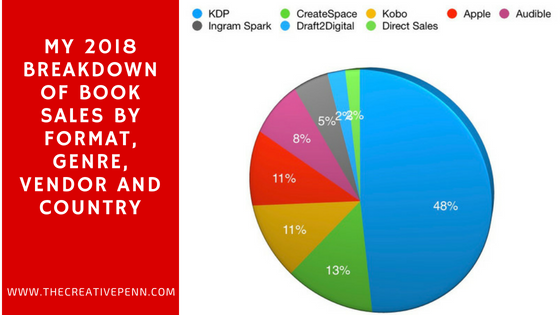 You can read previous years breakdowns on my author timeline here.
You can read previous years breakdowns on my author timeline here.
[Thanks to Russell Philips, Virtual Assistant at Author Help who collated all my figures from all the various platforms.]
These figures are all based on revenue, the money that has actually come into my bank account.
Because I publish through so many sources, I don't actually track book sales numbers very often. Let's be honest – the money is more important anyway!
Total sales and income
Just to be clear, I'm an author-entrepreneur and my income comes from multiple sources – book sales, affiliate sales, course sales, sponsorship, advertising revenue and Patreon, plus speaking fees. It's all documented in How to Make a Living with your Writing, available in ebook, print and audiobook formats.
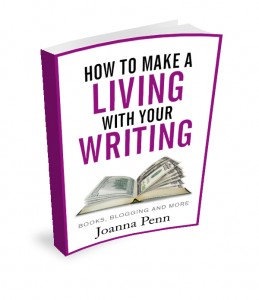
My book sales income has remained about the same, about 3x the UK national average income.
At least it's not dropped and I still make more money than most authors, based on the Guardian report that average earnings for British authors are now just £10,500.
Remember, I have never had a breakout success, and continue to subscribe to the consistent hard-working author model! You don't need to be a household name to make a decent living with your writing.
Of course, I also make less than some authors I know – some indie, some traditionally published. But comparisonitis is dangerous, and we should all be comparing our current selves against where we were last year, and where we want to be next year.
Here's the more detailed breakdown. [Click here for last year's graphs.]
Breakdown by vendor
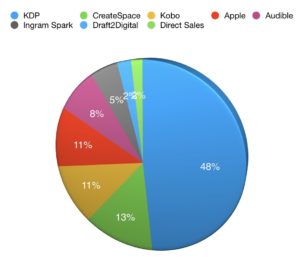
This does reflect my renewed focus on non-fiction audiobooks which I have found to be my most profitable audio income stream.
But remember, book sales are only one line item on my company income statement.
Amazon companies (KDP, Createspace, Audible) only make up 13% of my total company income. I am super proud of this as way back in 2014 when the Hachette/Amazon dispute was going on, it was clear that companies who relied on Amazon could find things going very badly when the rules changed. Reporting showed that some publishers had 65% or more of their revenue coming from Amazon, and would be in trouble if market situations shifted. At that point, Amazon companies were around 85% of my income and that's when I doubled down on multiple streams of income.
As I have said before, I am an independent creative and I will not depend on one company for my livelihood.
Breakdown by format
Print is up from 10% last year to 21% this year, and audiobook is up from 4% to 8%.
I have focused much more on print this year, with expansion into workbooks and Large Print, as well as doing every edition in my backlist on Ingram Spark, so my income in print is significantly better.
Audiobook income has doubled, based on doing more non-fiction audiobooks and keeping them exclusive on Audible. I find that non-fiction audiobook listeners are less sensitive to price and length, plus they are not so focused on celebrity narrators – plus, I have a podcast where I can advertise to audio listeners.
Click here for links to all my non-fiction audiobooks for Joanna Penn, and here for thrillers by J.F.Penn.
Breakdown of ebook sales by country
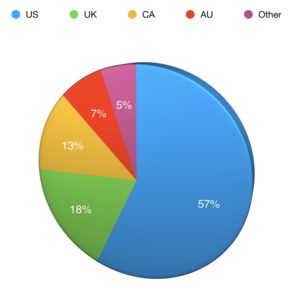
I think we will see more of a shift once streaming mobile internet is more pervasive and online retail becomes more common in big markets like India, Nigeria and the Middle East. Amazon's focus on amazon.in and opening up to Arabic language recently demonstrates that the future growth will be in those markets.
The 5% Other category includes sales in 41 countries, as reported through the Kobo Writing Life portal, which is the only one to include a funky world map!
Breakdown of fiction vs non-fiction
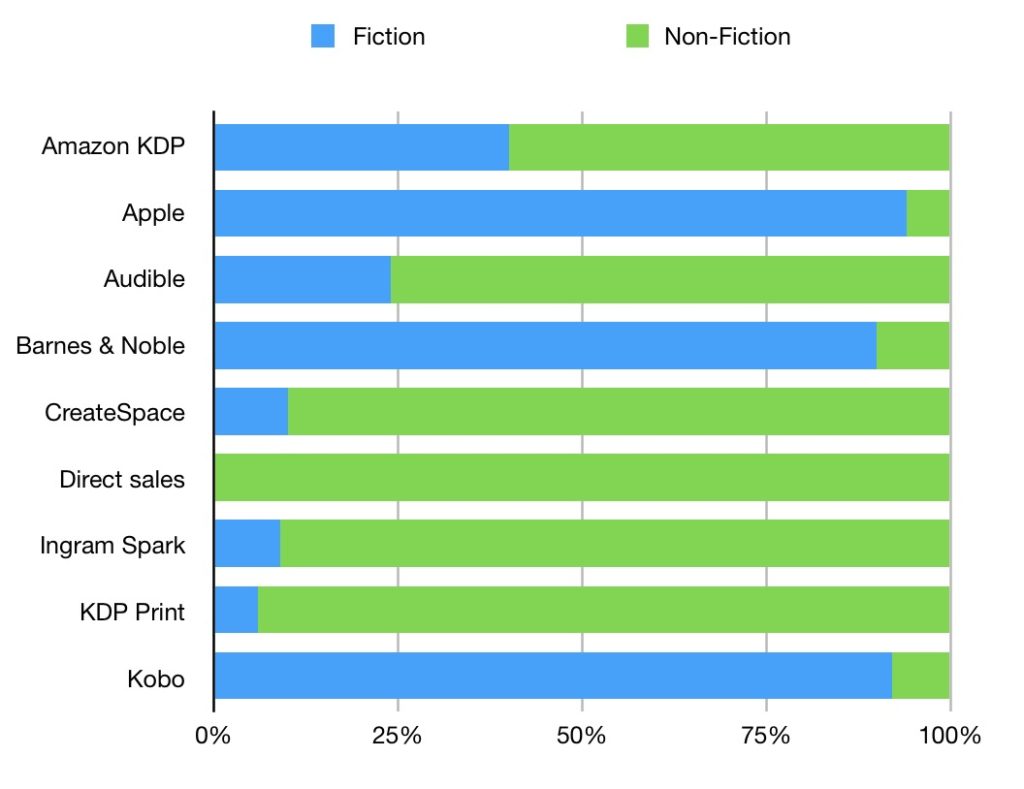
I also have fiction box-sets, short stories and multiple editions of all of these titles.
Fiction and non-fiction sell differently on different stores, as you can see from this graph.
Apple and Kobo are primarily fiction, mainly because one of the most consistent sales methods is a permanently free first in series. Plus, Kobo has a lot more promotions for fiction than it does for non-fiction. Boxsets continue to make up a large chunk of Kobo income, because they are easier to merchandize.
The print sales through Createspace, Ingram Spark and KDP Print are primarily non-fiction, which is not surprising to me, as non-fiction does incredibly well in print. Most of the print books on my own bookshelves are non-fiction. I devour 2-4 novels per week right now on my Kindle, but I only listen to non-fiction audiobooks and I only buy print non-fiction.
 Breakdown by author name
Breakdown by author name
I have cycled between 3 author names in the last year, and written books under each of them.
- Joanna Penn – How to Market a Book Third Edition, The Healthy Writer, How to Write Non-Fiction
- J.F.Penn – Map of Shadows, The Dark Queen short story. I also wrote a screenplay but that is not saleable at this time.
- Penny Appleton – Love, Second Time Around, Love, Home at Last, Love Will Find a Way
The time spent on the Penny books doesn't warrant the revenue received – and hopefully gives an indication of how difficult it is to start a new author name in a new genre without much marketing.
I have significantly more fiction books in total under J.F.Penn than I have non-fiction, but the larger revenue comes from Joanna Penn books. That's because I haven't written much fiction this year, and I have a much easier time with marketing non-fiction. So this split is not unexpected.
My thoughts on the results
I'm slightly disappointed that the total sales figure has remained the same given the number of books I put out last year – but my focus is often split between my multiple streams of income, and I'm not in KU or focused on book marketing every day.
As my friend and mentor, Yaro Starak, said on a recent podcast about website traffic, if you are not constantly feeding your income sources, they will atrophy and die. That's true whether it's web traffic or book sales.
But wait, I hear you cry! Didn't you write How to Market a Book? Why aren't you rocking the book sales and making six figures a month like A.N.Other indie author?
The truth is that I know what I should do if I want to earn more money from book sales:
- Write under one author name – instead of three: J.F.Penn, Joanna Penn, Penny Appleton, which splits my focus.
- Write in one (preferably popular) genre – instead of multiple genres: non-fiction self-help, action adventure thriller, religious conspiracy thriller, crime, dark fantasy, and sweet contemporary romance. Again, this splits my focus.
- Put out books in a series regularly, preferably within the 90-day window, instead of writing one book a year in multiple series. Yes, you guessed it, this splits my focus.
- Cut out some of my other multiple activities – of which there are many, all splitting my focus!
- Be consistent and organized with advertising my books instead of getting to the end of the month and flinging some ads up, or remembering to do ad stacking on launch but not for the rest of the year.
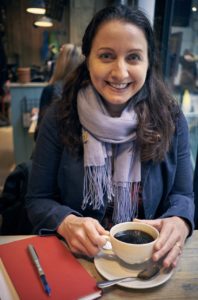
But one of the most important things in a creative career, or in fact as part of life in general, is to Know Thyself – as the ancient Greeks had carved above the temple of Delphi.
I know that I can't just do one thing, my brain doesn't work that way. I can't just write one genre, or one series, or do the same thing for too long. My creative self would go nuts, so some form of focus splitting is inevitable for my character type.
So Creatives, do what I say, don't do what I do! (Unless like me, you are an eclectic mind who can't stop doing all the crazy stuff!)
So, what will I do to increase book sales revenue in the next year?
With all that focus splitting in mind, here's what I intend to do:
(1) Stop writing Penny Appleton
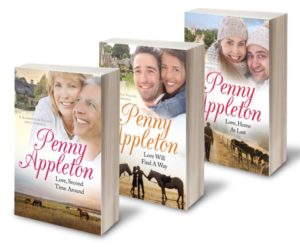
I need to get back to writing what I love – which is thriller, crime, dark fantasy, and horror. I'll be doing a podcast with Mum to discuss lessons learned in the next month or so. We're both pleased with the 3 books, but now that episode is complete and we can move on.
(2) Focus on writing J.F.Penn books for the next 18 months
I want to keep serving the writer community (you guys!) but I can do that through my podcast, blog, YouTube channel, and my courses, so no more non-fiction books until 2020. I'll be recording some video lectures on different topics, and I'll be updating the older books, but no more new books for Joanna Penn.
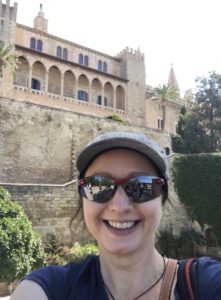
My writing time is for J.F.Penn. I'm currently working on Valley of Dry Bones (ARKANE #10), and probably a novella based in Amsterdam after that. Then the next 2 books in the Mapwalker series. Then I have a standalone horror I want to write, and more in the London Psychic series.
As much as I have been enjoying screenwriting, I just can't focus on it right now. It's a whole new way of writing and I need to focus on my first love, which is fiction. I read for at least an hour every day for pleasure – and it's always books. Never scripts. I'll circle back to scripts at some point, but for now, back to the novels.
If you want to keep up with what I'm doing for fiction, you can follow my journal at www.JFPenn.com/now.
I'll also be focusing more on content marketing for fiction, and yes, there will be some sporadic paid ads for launches.
(3) Make more of what I already have
Update my older non-fiction books and get my backlist into audio and other print formats, like workbooks and Large Print.
Expand formats. I need to get all my books onto Google Play. I intended to do that last year and didn't get round to it. Now PublishDrive has signed a deal with a Chinese ebook distributor, I'll be using them for Play and other vendors – in addition to going direct with Amazon KDP, Kobo Writing Life, Apple Books, and also using Draft2Digital.
License rights to foreign markets. Even as I type this, we are negotiating a deal for South Korean rights. Rights deals add money to the bottom line without taking any more time to write more books. They make more of what we already have. You don't need an agent. You can pitch and negotiate deals yourself. Read these 2 books before you try anything! Closing the Deal on your Terms by Kristine Kathryn Rusch, and How Authors Sell Publishing Rights by Orna Ross and Helen Sedwick.
So that's my round-up. Have you reported on your annual sales revenue and broken it down this way? Please do share in the comments if you have anything, or ask any questions you'd like answered.
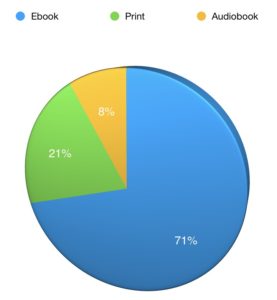
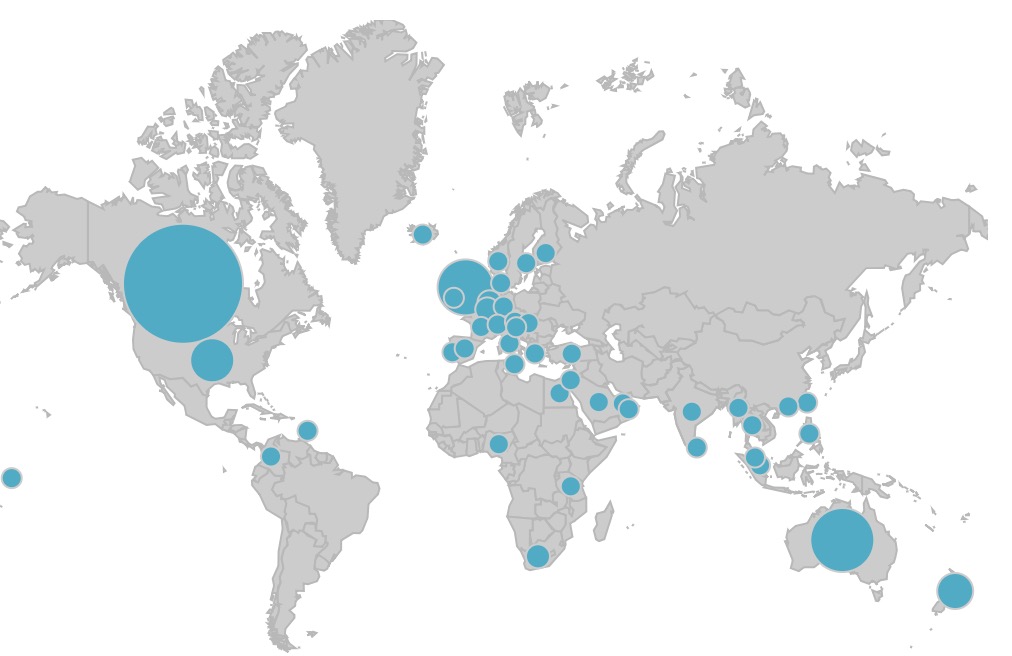
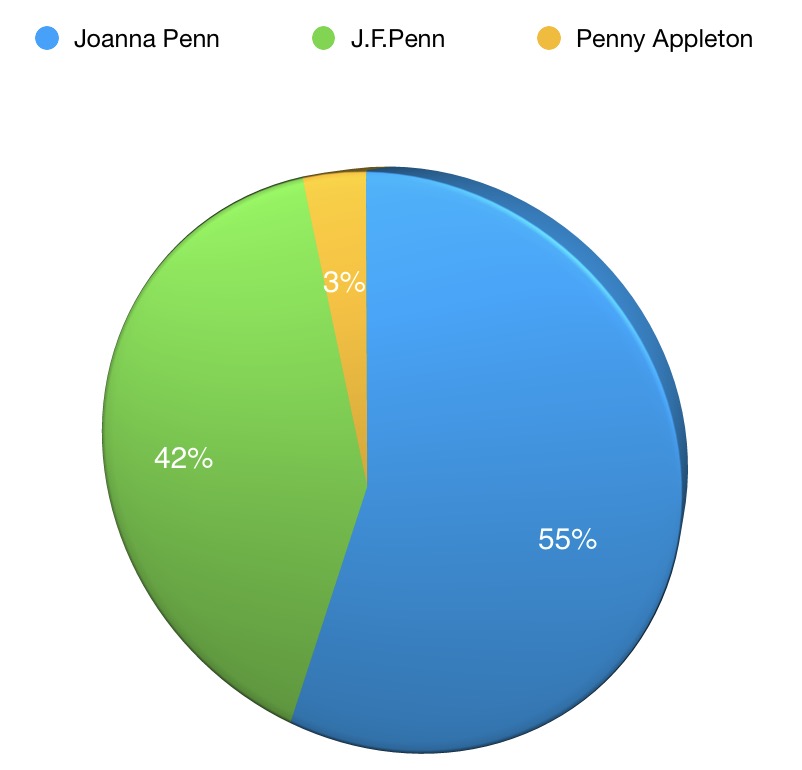



Hi Joanna, thank you for this post, and your many others.
After five years of writing part time I am going full time in September! It is scary, but very exciting.
And I know I need to focus more.
I also write in three different genres, Horror, YA and Romance, and I also lead creative writing workshops for primary children, teens and adults, plus I blog every week. Obviously whilst holding down a part-time job and having a family this has split my focus badly. I realised the other day that it has been a year and a half since I last published a full length novel!
So yes, your post was a good reminder to focus on the writing.
And the s=creative writing workshops.
And the blog.
Oh no, there I go again.
At least I will have more time to do all this once I finish work!!
Thanks again for your advice.
Hi Ken, I understand the need to juggle multiple streams of income.
But I think it’s about what aspects (a) you want to do creatively and (b) what makes an income – especially if you are going full-time.
Leading workshops generally makes short-term income, which is necessary to pay bills, but it doesn’t build intellectual property which is longer term income.
Blogging can be good for income if you use it strategically for affiliate income or other sales.
It’s tough but important to look at things when going full-time 🙂 I focused on speaking, live workshops, products and affiliate income while I grew my book sales income at the beginning. All the best!
A great article. Thank you as always for sharing so generously. It’s refreshing to see someone with a business mind looking analytically at their body of work, and yet maintaining their creative soul. Love it!
What I have been wondering a lot about lately, is how on earth to get a mentor. I gather it’s not like having a coach, where you pay them an hourly rate. Of course, you need someone more advanced than yourself, but not necessarily in the same industry.
Were you just lucky enough to know Yaro, or did you meet along your business journey?
I listened to Yaro’s podcast, read his blog and then bought his course. This is what I have always done in order to learn 🙂 I have never had a “mentor” in person – I have just read books, listened to audios, paid for access to premium courses and paid to attend live events and conferences. That’s the best way to find virtual mentors and how most of us do it!
Excellent data! I’m about to publish my first novel. These analytics are a huge help in giving me something to start from with my projections. Also, I was looking at Damonza and saw that you posted a discount code! Thank you so much! This is so helpful to a new author.
Damonza is excellent 🙂 Glad you found this useful!
Thank you for all of your great guidance. I have two books on Amazon and a third in progress (very slowly), just getting back in the mood. Have not done anywhere the marketing required in order to achieve the level of success I would like.
Of all the online help and advice; yours is the most inspiring. Will be looking forward to more of your guidance and advice.
Glad you’re finding it useful 🙂